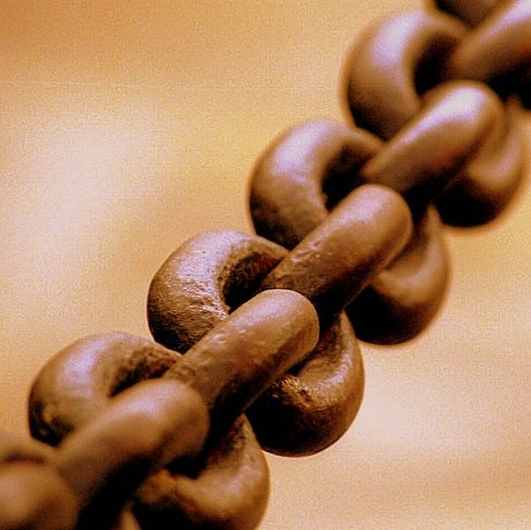Both Legalism and License underestimate sin. Legalism underestimates sin’s depth in the Christian’s life. License underestimates sin’s danger in the Christian’s life.
Legalism stems from a misunderstanding of how pervasive sin is in our lives. The legalist thinks of sin atomistically, that is, he thinks of sin as a set of individual, discrete actions he either does or doesn’t do.
The legalist thinks, “There are thoughts, words and deeds that I do that are sins; and there are thoughts, words and deeds that I do that are sinless.” The legalist’s goal is to decrease the sinful thoughts, words and deeds in his life, and increase the sinless thoughts, words and deeds in his life.
The legalist thinks that if he could break up his life up into individual seconds, he could identify the seconds when he was sinning, and the seconds when he was sinless.
Of course the Bible doesn’t support this view of sin at all. The Ten Commandments in particular, show us that there is nothing we think, say or do that is sinless. Everything we do is stained by sin, even our good works: “All our righteous deeds are like a polluted garment.” (Isaiah 64:6)
The devil loves it when the legalist strives for sinlessness. It means he’s trying to achieve a righteousness of our own that comes through the Law (Galatians 2:16). The Old Adam thrives on the legalist’s rule-keeping, it is his lifeblood, it makes him very strong.
 License stems from a misunderstanding of how dangerous sin is in our lives. The licentious person views sin as harmless, and without serious consequences or penalty. The devil loves this too. It means that the licentious person no longer fears sin or its penalty. Of course, the licentious person must ignore the constant drumbeat of the Bible, warning of sin and divine judgment. From Genesis to Revelation Scripture warns that sin is dangerous and incurs God’s wrath.
License stems from a misunderstanding of how dangerous sin is in our lives. The licentious person views sin as harmless, and without serious consequences or penalty. The devil loves this too. It means that the licentious person no longer fears sin or its penalty. Of course, the licentious person must ignore the constant drumbeat of the Bible, warning of sin and divine judgment. From Genesis to Revelation Scripture warns that sin is dangerous and incurs God’s wrath.
The devil also loves it when a licentious person ignores sin’s danger and penalty. It means he’s ignoring God himself and living in open rebellion against Him (Psalm 36:1; Romans 3:18). The Old Adam hates God and His commandments.
Both Legalism and License prevent the Christian from struggling against his sin. The legalist thinks that he is struggling against sin successfully, more or less. The licentious person has given up the struggle against sin altogether. Neither the legalist nor the licentious are able to avoid sin or its penalty. This is because neither is really struggling against sin at all.
Isn’t the legalist at least struggling against sin? No. The legalist thinks he is struggling against his sin; but he is only struggling to keep the rules, God’s rules, house rules, etc. Struggling to keep the rules isn’t the same as struggling against sin.
 In fact, the legalist’s rule-keeping is no better than the licentious person’s rule-breaking. St. Paul says, “through the commandment [sin] might become sinful beyond measure.” (Romans 7:7-13; 5:20) The legalist’s rule-keeping and the licentious person’s rule- breaking only increase sin and its power in their lives.
In fact, the legalist’s rule-keeping is no better than the licentious person’s rule-breaking. St. Paul says, “through the commandment [sin] might become sinful beyond measure.” (Romans 7:7-13; 5:20) The legalist’s rule-keeping and the licentious person’s rule- breaking only increase sin and its power in their lives.
The Christian struggle against sin is not done by rule-keeping, but by repentance.
Some Christians think that to avoid the error of License, it’s OK to be a little legalistic. Other Christians think that to avoid the error of Legalism it’s OK to practice a little License. Both are wrong.
As you can see, Legalism and License are not two different errors. They are the same error expressed in two different ways. Whether you travel the path of Legalism or of License, you come to the same, inevitable end.
Both the legalist and the licentious, whether they deny sin’s depth or sin’s danger, ultimately ignore the saving work of Jesus Christ.
 The assumption Legalism and License share, “God cannot forbid something I cannot avoid,” undermines both Jesus’ sinlessness, and his sacrifice for sin. The legalist believes he can avoid sin, and manage (if only occasionally) to live sinlessly. If he is right, then the legalist doesn’t need the sinlessness of Jesus, or if he does, he only needs it when he fails to avoid sin. The licentious person believes he has permission to sin. If he is right, then the licentious person doesn’t need Jesus to suffer the penalty for his sin.
The assumption Legalism and License share, “God cannot forbid something I cannot avoid,” undermines both Jesus’ sinlessness, and his sacrifice for sin. The legalist believes he can avoid sin, and manage (if only occasionally) to live sinlessly. If he is right, then the legalist doesn’t need the sinlessness of Jesus, or if he does, he only needs it when he fails to avoid sin. The licentious person believes he has permission to sin. If he is right, then the licentious person doesn’t need Jesus to suffer the penalty for his sin.
If Legalism and License are really the same error, is there one answer to both? Yes, first the Law.
The legalist needs to see that he is totally sinful, from top to bottom, from beginning to end. The legalist needs to see himself as total sinner, and say along with St. Paul, “I know that nothing good dwells in me,” and, “Wretched man that I am! Who will deliver me from this body of death?” (Romans 7:18, 24)
The licentious person needs to see his sin for what it is: open rebellion, enmity and insult against God. Though he may take his sin lightly, God does not. The licentious person needs to answer along with St. Paul, “Are we to continue in sin that grace may abound? By no means!” and, “Are we to sin because we are not under law but under grace? By no means!” (Romans 6:1-2, 15)
The first answer to both Legalism and License is God’s Word of Law. The proclamation of the Law leaves the legalist with no place to stand; no thought, word or deed –no second of his life– that he can call sinless. Likewise, the Law leaves the licentious person on God’s enemies list; an impudent creature, spitting in God’s face with every sin. The first answer to both Legalism and License is God’s Word of Law that condemns sin completely; but we can’t stop there.
What comes next is counterintuitive. Many preachers think that they can cure people of licentiousness by preaching the Law more. This is a good first step, but the Law is only the diagnosis and prognosis. The Law alone isn’t the cure for licentiousness. Preachers sometimes think that Legalism can be cured by really driving the Law home to those who think they are keeping it. Again this is a good first step, but the Law alone cannot cure Legalism either. Why are our churches filled with both the legalists and the licentious? Because our pulpits are not filled with both Law and Gospel.
The Law destroys the common, false assumption of both Legalism and License: “God cannot forbid something I cannot avoid.” The Law says to the legalist, “You cannot avoid sin.” The Law says to the licentious, “There is a penalty for your sin.” However, this is all that the Law can do.
 Only the Gospel gives both the legalist and the licentious freedom from their error, not by avoiding sin, nor by indulging sin, but by forgiving sin. Only the Gospel shows the legalist the sinlessness of Jesus Christ, and the licentious the penalty Jesus paid for sin.
Only the Gospel gives both the legalist and the licentious freedom from their error, not by avoiding sin, nor by indulging sin, but by forgiving sin. Only the Gospel shows the legalist the sinlessness of Jesus Christ, and the licentious the penalty Jesus paid for sin.
Some pastors are hesitant to preach the Gospel to the legalist and the licentious –especially to the licentious. They reason, “If I proclaim the forgiveness of sins in Jesus Christ, this legalist will only use that forgiveness to go and start sinning; or this licentious person will only use that forgiveness to go and sin even more.”
These pastors understand nothing about Law and Gospel. They mistakenly think that the Gospel needs to be “balanced” or tempered with a dose of the Law, or Christians will become lax about sin or lazy in doing good works. By doing this, pastors only reinforce the error of both the legalist and the licentious.
The Gospel says, “Yes, God always forbids sin, and you can never avoid sin. But the very sin you cannot avoid, Jesus avoided for you. The very sin God forbids and condemns, Jesus took to the Cross in his body for you.”
Theologians call it the active and passive obedience of Christ. The Gospel replaces all the legalist’s efforts to be sinless with the sinlessness of Jesus. The Gospel shows the licentious person the true penalty for his sin, taken entirely by Jesus.
 The continual proclamation both of Law and Gospel is the only cure for Legalism and License. Not only that, but only the continual proclamation of Law and Gospel engages the Christian in the true struggle against his sin, the very sin that God forbids, the very sin that cannot be avoided.
The continual proclamation both of Law and Gospel is the only cure for Legalism and License. Not only that, but only the continual proclamation of Law and Gospel engages the Christian in the true struggle against his sin, the very sin that God forbids, the very sin that cannot be avoided.
The licentious person thinks that the struggle against sin is unnecessary. The legalist thinks that the struggle against sin is all about rule-keeping. Both are wrong.
Scripture is clear. God never gives us permission to sin, but we can’t avoid sin. If you can’t avoid sin or its penalty, there is only one thing to do: repent. Repentance is the true struggle against sin. Repentance kills the Old Adam. The devil hates it when we repent. It means that we, like St. Paul, are seeking the righteousness of Jesus Christ that comes by faith:
Indeed, I count everything as loss because of the surpassing worth of knowing Christ Jesus my Lord. For his sake I have suffered the loss of all things and count them as rubbish, in order that I may gain Christ and be found in him, not having a righteousness of my own that comes from the law, but that which comes through faith in Christ, the righteousness from God that depends on faith. (Philippians 3:8-9)
Once the legalist finds his sinlessness in Jesus alone, and once the licentious person finds the penalty for sin paid in Jesus alone, then the struggle against unavoidable sin can really begin. The former legalist will now struggle like he’s never struggled before. Because now, he won’t be able to take a breather and say, “OK, right now I’m not sinning, if only for this one second.” No, there won’t be a single second in his life when sin will not be there, close at hand (Romans 7:21). The former licentious person will struggle against sin, perhaps for the first time. Now, he won’t be able to sin without hearing the Law’s condemnation; he won’t be able to ignore sin’s penalty.
Now, both will struggle against their sin by repentance every second, in every thought, every word and every deed. Under the proclamation of Law and Gospel, their lives will become lives of constant repentance and faith in Jesus’ all-sufficient sinlessness and sacrifice.
You may have noticed as you began reading that it was difficult to diagnose yourself as either a legalist or as licentious. That is because we are all both. We go back and forth between the two every day. We think we can avoid sin sometimes, we give ourselves permission to sin at other times. But God’s Word will not permit our Legalism or our License.
God’s Word puts us in the impossible position of struggling against our sin, the very sin that God forbids, the very sin that we cannot avoid. This position is impossible for us, but not for Jesus Christ. Jesus has taken our sin, the very sin that God forbids, the very sin that we cannot avoid. So, whether you’re a legalist or licentious, repent and trust Him...---------Todd Wilken, Brothers of John the Steadfast
 "Clothe yourselves, all of you, with humility toward one another, for God opposes the proud but gives grace to the humble. Humble yourselves, therefore, under the mighty hand of God so that at the proper time he may exalt you, casting all your anxieties on him, because he cares for you." -- 1 Peter 5:5-7
"Clothe yourselves, all of you, with humility toward one another, for God opposes the proud but gives grace to the humble. Humble yourselves, therefore, under the mighty hand of God so that at the proper time he may exalt you, casting all your anxieties on him, because he cares for you." -- 1 Peter 5:5-7



 License stems from a misunderstanding of how dangerous sin is in our lives. The licentious person views sin as harmless, and without serious consequences or penalty. The devil loves this too. It means that the licentious person no longer fears sin or its penalty. Of course, the licentious person must ignore the constant drumbeat of the Bible, warning of sin and divine judgment. From Genesis to Revelation Scripture warns that sin is dangerous and incurs God’s wrath.
License stems from a misunderstanding of how dangerous sin is in our lives. The licentious person views sin as harmless, and without serious consequences or penalty. The devil loves this too. It means that the licentious person no longer fears sin or its penalty. Of course, the licentious person must ignore the constant drumbeat of the Bible, warning of sin and divine judgment. From Genesis to Revelation Scripture warns that sin is dangerous and incurs God’s wrath.  In fact, the legalist’s rule-keeping is no better than the licentious person’s rule-breaking. St. Paul says, “through the commandment [sin] might become sinful beyond measure.” (
In fact, the legalist’s rule-keeping is no better than the licentious person’s rule-breaking. St. Paul says, “through the commandment [sin] might become sinful beyond measure.” ( The assumption Legalism and License share, “God cannot forbid something I cannot avoid,” undermines both Jesus’ sinlessness, and his sacrifice for sin. The legalist believes he can avoid sin, and manage (if only occasionally) to live sinlessly. If he is right, then the legalist doesn’t need the sinlessness of Jesus, or if he does, he only needs it when he fails to avoid sin. The licentious person believes he has permission to sin. If he is right, then the licentious person doesn’t need Jesus to suffer the penalty for his sin.
The assumption Legalism and License share, “God cannot forbid something I cannot avoid,” undermines both Jesus’ sinlessness, and his sacrifice for sin. The legalist believes he can avoid sin, and manage (if only occasionally) to live sinlessly. If he is right, then the legalist doesn’t need the sinlessness of Jesus, or if he does, he only needs it when he fails to avoid sin. The licentious person believes he has permission to sin. If he is right, then the licentious person doesn’t need Jesus to suffer the penalty for his sin.  Only the Gospel gives both the legalist and the licentious freedom from their error, not by avoiding sin, nor by indulging sin, but by forgiving sin. Only the Gospel shows the legalist the sinlessness of Jesus Christ, and the licentious the penalty Jesus paid for sin.
Only the Gospel gives both the legalist and the licentious freedom from their error, not by avoiding sin, nor by indulging sin, but by forgiving sin. Only the Gospel shows the legalist the sinlessness of Jesus Christ, and the licentious the penalty Jesus paid for sin.  The continual proclamation both of Law and Gospel is the only cure for Legalism and License. Not only that, but only the continual proclamation of Law and Gospel engages the Christian in the true struggle against his sin, the very sin that God forbids, the very sin that cannot be avoided.
The continual proclamation both of Law and Gospel is the only cure for Legalism and License. Not only that, but only the continual proclamation of Law and Gospel engages the Christian in the true struggle against his sin, the very sin that God forbids, the very sin that cannot be avoided. 
:max_bytes(150000):strip_icc():focal(2807x0:2809x2)/new-born-baby-149355115-5769d2c13df78ca6e48c77a5.jpg)




